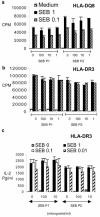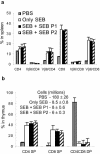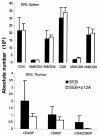In vitro and in vivo evaluation of staphylococcal superantigen peptide antagonists
- PMID: 15501813
- PMCID: PMC522998
- DOI: 10.1128/IAI.72.11.6733-6737.2004
In vitro and in vivo evaluation of staphylococcal superantigen peptide antagonists
Abstract
Superantigen peptide antagonists failed to block T-cell activation and cytokine production as well as toxic shock induced by staphylococcal enterotoxin B (SEB) in HLA class II transgenic mice. They also failed to inhibit the binding of SEB to HLA class II molecules as well as activation of human T lymphocytes in vitro.
Figures







References
-
- Arad, G., D. Hillman, R. Levy, and R. Kaempfer. 2004. Broad-spectrum immunity against superantigens is elicited in mice protected from lethal shock by a superantigen antagonist peptide. Immunol. Lett. 91:141-145. - PubMed
-
- Arad, G., D. Hillman, R. Levy, and R. Kaempfer. 2001. Superantigen antagonist blocks Th1 cytokine gene induction and lethal shock. J. Leukoc. Biol. 69:921-927. - PubMed
-
- Arad, G., R. Levy, D. Hillman, and R. Kaempfer. 2000. Superantigen antagonist protects against lethal shock and defines a new domain for T-cell activation. Nat. Med. 6:414-421. - PubMed
-
- DaSilva, L., B. C. Welcher, R. G. Ulrich, M. J. Aman, C. S. David, and S. Bavari. 2002. Humanlike immune response of human leukocyte antigen-DR3 transgenic mice to staphylococcal enterotoxins: a novel model for superantigen vaccines. J. Infect. Dis. 185:1754-1760. - PubMed
-
- Hong-Geller, E., and G. Gupta. 2003. Therapeutic approaches to superantigen-based diseases: a review. J. Mol Recognit. 16:91-101. - PubMed
Publication types
MeSH terms
Substances
Grants and funding
LinkOut - more resources
Full Text Sources
Research Materials

